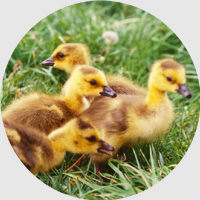
-
I've Found a Baby Bird!
Use this quick step-by-step guide to find out if the bird you've found needs help, and if so where to find assistance.
-
What Should I Do...?
Useful information on how to resolve some common situations involving altricial baby birds.
-
How Can I Help?
There are many ways that you can make a critical difference for baby birds. Please take action today!
-
In My Neighbourhood
A guide to the wonderful and varied baby birds you can find right in your own back yard!
-
About T.W.C.
Since 1993, Toronto Wildlife Centre has helped many thousands of wild animals in need. Find out more about the work we do.
HelpBabyBirds.ca
Copyright © 2010 Toronto Wildlife Centre.
I've Found a Baby Bird!

What kind of bird have you found?
Baby birds fall into two general categories based on how developed they are at hatching:
Altricial and Precocial.
While exact species identification is not usually necessary, you must at least know which category the baby falls into in order to determine whether it needs help.

Altricial Red-Winged Blackbird
Altricial birds hatch with no feathers, though occasionally they have sparse down or bits of fluff). These babies spend the first 1-3 weeks of their life in a nest, and are totally dependent on their parents for care. As they get bigger and their feathers grow, the babies gradually become more mobile.
Once they can jump around well (but sometimes before they can fly) they leave the nest. Their parents bring them food both before they leave the nest and after, when they are learning to forage. Some altricial birds gape their mouths wide open for food, and have yellow or white skin on the sides of their beak. Any baby that has visible naked patches on its body is altricial, or is uninjured but cannot walk around well is altricial. Most songbirds fall into this category, as do hawks, owls, doves, crows, woodpeckers, cormorants, and herons.

Precocial Goslings
Precocial birds hatch fully covered with soft down (with no naked areas) and are walking or running within hours of hatching. They abandon the nest soon after hatching (usually within a day or two) and then follow their parents around on foot or in the water for a number of weeks.
Examples of some common precocial birds are geese, swans, ducks and quail. Most precocial baby birds can eat on their own and do not depend on their parents to feed them, however they do need their parents to keep them warm at night, to act as role models, and to protect them from predators.
Once you have determined what kind of baby you have found, proceed to Step 3.